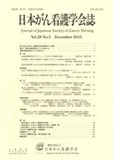Japanese
English
- 販売していません
- Abstract 文献概要
- 参考文献 Reference
- サイト内被引用 Cited by
要旨
本研究の目的は,初回治療段階にある中年期の悪性神経膠腫患者の体験のゆらぎの様相を明らかにすることである.悪性神経膠腫で初回治療中である40〜50歳代の患者5名を対象に半構成的面接を行い,修正版グラウンデッド・セオリー・アプローチに基づき分析を行った.
その結果,対象者は【脳腫瘍は驚怖】と感じながらも,【治療に賭ける】強い決意を持ち治療に臨んでいたが,終(つい)には【脳腫瘍による崩壊】という生きること自体の危機を体験していた.さらに,家族や周囲の人々との相互作用による【存在価値の迷い】は,いく度も繰り返す【変化した外見への動揺】と【同病者との相互作用の光と影】の《同病者との同一視による辛さ》の影響を受けゆさぶられ,アイデンティティはゆらぎ,不確かなものになっていた.一方,【同病者との相互作用の光と影】の《同病者は一筋の光で救い》により勇気づけられ,価値の転換といえる【今後の生き方を模索する】自分を認識していた.この体験は,脳腫瘍による生きること自体の危機という,非常に強大でゆらぎがないネガティブな体験が根底に存在するからこそ,アイデンティティの均衡を保持するようにゆらぐことで,いっそう複雑で混沌とした様相を呈していたと考えられる.
中年期のアイデンティティの危機にゆらぎながらも懸命に自分らしく生きることを模索する患者と家族をともに支え,思いに沿った看護支援の必要性が示唆された.
The purpose of this study was to clarify yuragi as experienced by middle-aged patients who are undergoing initial treatment for Malignant Glioma. The subjects included five patients aged 40-50 years undergoing initial treatment. Semi-structured interviews were performed, and the data was analysed using a Modified Grounded Theory Approach.
Results revealed that while subjects were “surprised and frightened by the presence of a brain tumor”, they began treatment with the determination “to take a chance with treatment”. However, they eventually faced a critical live-threatening situation as serious as “collapse due to brain tumor”. Furthermore, they had “doubt regarding the value of their existence” came about when interacting with family and friends. They were agitated by “unrest due to changes in their appearance” and “difficulties identifying with other patients suffering from the same disease”- or “the bright and dark side of interacting with fellow patients”. Therefore, they were experiencing an identity crisis. Meanwhile, they were encouraged by the notion that “people suffering from the same disease are a ray of light and salvation”, having a positive effect on the “the bright and dark side of interacting with fellow patients”. They then found themselves feeling “positive about a future lifestyle” and revaluating their existence.
Due to the fact that the danger of living with a brain tumor is negative, confusing and difficult, it brought about more complex and chaotic aspects to the patients' experiences as they fought to maintain a healthy balance in the way they identify with themselves.
There is an opportunity here for nurses to provide support to the families and also to the patients having middle-aged identity crises to help them live their lives properly, and to help meet their requests and desires.
Copyright © 2015, Japanese Society of Cancer Nursing All rights reserved.


